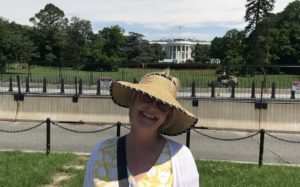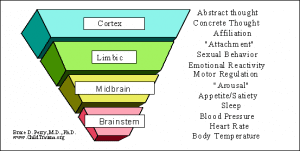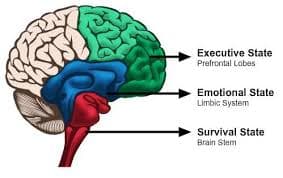Why there is an urgent need for training on strained child/parent relationships and estrangement:

Independent Social Worker, Patricia Barry-Relph reports on her recent trip to Washington for the Association of Family and Conciliation Courts 55th annual conference
The Association of Family and Conciliation Courts AFCC is an interdisciplinary and international association of professionals dedicated to improving the lives of children and families through the resolution of family conflict and I became a member of the AFCC in February 2018. An opportunity arose for me to apply for one of the 19 international scholarships to attend AFCC’s 55th Annual Conference, Compassionate Family Court Systems: The Role of Trauma-Informed Jurisprudence in June 2018 in Washington DC and to my surprise I was awarded a scholarship.
I had only ever been to Washington DC once before in 2003 with Professor Olive Stevenson, who was the keynote speaker at the Clinical Social Work Institute in Washington DC. Olive and I had lots to talk about on the plane and throughout the week about her relationship with Clare Winnicott, a social worker- who was married to D.W. Winnicott, paediatrician and psychoanalyst - about her social work career, her relationship with the Winnicotts and how this shaped her social work practice. So excitedly, in mind of Olive, I flew to Washington DC for the AFCC Conference.
The Hon. Robert Morin, Chief Judge, Superior Court of DC, introduced Jaycee Dugard, Author, ‘A Stolen Life and Freedom: A Memoir’, who gave the opening address. In 1991, Jaycee was kidnapped by two strangers from a bus stop in her hometown of Lake Tahoe. She survived years of physical, sexual and emotional abuse at the hands of her assailants. She went on to give birth to two daughters while she was in captivity. She escaped with her children and was finally reunited with her mother and family in 2009, 18 years after she had been taken. She and her family created the JAYC Foundation in 2011. The Foundation’s message is, “Just Ask Yourself to Care” and its mission is to help families that have suffered a familial or non-familial abduction or other trauma; to spread the message of compassion and awareness through educational programmes; and to encourage the collaboration of various entities to provide protected spaces for families to heal. Jaycee’s opening speech was both moving and inspiring which resulted in a standing ovation from the 3,500 delegates.
I attended a lecture on Trauma Sensitive Early Intervention, by Lyn Greenberg, PhD, ABPP, Robin Deutsch, PhD ABPP, and Hon. Herman Walker. In my own practice, I assess a lot of parents who may have been traumatised in one way or another when they were children. They carry this trauma into their intimate partner relationships and the impacts of this re-emerge in vulnerabilities to resolve conflict. The role of trauma and its influence on children, if identified early enough, could stem the rise of inter-parental conflict, which all the research is agreed, leads to maladjustment in children in adult life. The lecture outlined the different sources of trauma which may be relevant to families involved in child contact and residence disputes.
The effects of ongoing trauma for children can affect brain development causing them to come to the attention of teachers and social workers as under-performing in school when they have more ability.

Understanding the Effects of Child Maltreatment on Brain Development (ChildWelfare.gov)

The Conscious Discipline Brain State Model
Post-Traumatic Stress Disorder diagnosis is higher in girls who can internalise their distress while boys may externalise. This can lead to children having difficulties identifying their emotions and they may develop an impaired ability to distinguish threat. Children often present as acting without thinking and have a damaged relationship between behaviour and consequences. Children can become disconnected from their bodies, hold on to stress, develop somatic symptoms and their academic performance can be impaired. There are overlaps with speech and language development and multi-brain activity is affected. The executive state which asked the question, “am I safe?” in the prefrontal lobe is affected. The emotional state which asks the question, “am I loved?” and the survival state are all affected.
For Independent Social Workers like myself tasked with eliciting a child or children’s ‘ascertainable’ wishes and feelings, in light of their age and understanding, there are important considerations to bear in mind in relation to the impact trauma may have had on the child’s capacity to identify and name their feeling states, as children’s feelings influence their wishes. In the process of my ISW assessments, my experience in high conflict cases, has led me to conclude some of these children’s attachments to one parent over the other, are ‘traumatic attachments’ (Dutton & Painter: 1981). The nature of this type of attachment is distinguished by feelings of an intense bond, cognitive distortions and behavioural strategies of one parent with a child that paradoxically strengthens and maintains the bond between them.
ISW’s might be interested in an article’ “Whose Wishes and feelings? Children’s Autonomy and Parental Influence in Family Court Enquiries”, British Journal of Social Work (2007) 37, 785 – 805.
In recognition of the fact that traditional models of therapy have failed children of high conflict and acrimonious divorce Jeffrey Levy, LCSW presented a paper on Child Focussed Separated Family Therapy CFSF. The focus of the approach is to tease out reflective parental capacity. The research validated therapeutic approaches utilised in the CFSF model include:
- Cognitive behavioural therapy
- Solution focussed therapy
- Psycho-educational approaches
- Systemic therapy
- Family systems approach
The goals are:
- Reduce anxiety related to living in two households
- Foster improvements in relationships with both parents
It is based on the assumptions from the beginning:
- Parents want to see their children happy
- Parents are telling the truth from their perspective
- Each parent’s perspective will be different
- A child is harmed when exposed to their parent’s high conflict relationship
- Children instinctually tell each parent what they believe they want to hear, often resulting in each parent hearing a different message from their child
- Parents typically want to act in a manner that they believe is going to benefit their child
The leverage for change is generally the parent’s concern for the child.
There was a really interesting presentation by two social scientists from the Australian National University, Bruce Smyth and Lawrie Moloney introduced by Hon. Tom Altobeli on, Entrenched Post-Separation Parenting Disputes: The Role of Inter-parental Hatred? The Hon. Tom Altobeli spoke vividly about his experiences as a Judge of hatred observed in court. There was an eloquent description of his experiences of the palpable taste and sense of hatred parents have for each other in the courtroom. He offered a phenomenological judicial perspective, which he said had many limitations.
The lecture addressed the reliance on the emerging perspective that the term “high conflict” oversimplifies the nature of destructive family dynamics in parents who remain deeply enmeshed in acrimony years after the separation. Inter-parental hatred was proposed as a key relationship dynamic driving the behaviour of some in this group. The aims of the lecture were to help professionals distinguish ‘reactive’ hatred from ‘entrenched’ hatred and to recognise the underlying dynamics of hatred. How to appropriately challenge expressions of hatred and how to support those who are the objects of hatred. How should the assessment of entrenched hatred guide a social worker when making recommendations for contact or residence?
Underlying dynamics of hatred
- Entrenched hatred emphasizes that the “conflict” is deeply rooted in the psychological needs and childhood experiences of one or both parents
- It helps the parents defend against intolerably painful feelings of loss, hurt, being ignored and stuck
- It protects the parents from a catastrophic sense of humiliation, defeat, even annihilation
- Projects internal conflict outwards
- ‘Loving hate’ – seek to destroy but desperately needed
- Substitute for love – ‘hostile dependency’
- ‘Reunion behaviour’ – connection and proximity
Impact of hatred on children
It is more powerful to speak of children growing up in an atmosphere of hatred than to speak of exposure to high conflict. Hatred is frightening to children and leads to an erosion of their sense of emotional security. Children learn that hatred is stronger than love, destructiveness stronger than constructiveness. Impacts include:
- Sacrificing children’s social, cognitive and emotional development
- “Alienation”
- Compromising their sense of safety
Impact of hatred on parenting
- Impairment in the ability to see the child as a separate individual
- The autonomous needs of the child are subordinated or sacrificed to the parent’s needs related to their hatred of the other parent
- Entrenched hatred leads to an erosion of the quality of each parent’s parenting and to parental authority
- Also leads to distortions in the protective component of parenting
- Parent involves the child in conflict with other parent / does not shield the child from the conflict or from his / her emotional distress and anger
- Parent seeks to “protect” the child from the other parent in the absence of substantiated risks to the child
I attended a lecture on adverse childhood experiences ACE’s: ‘The Elephant in the Room, and improving the response to divorcing co-parents’. This workshop was presented by Karen Oehme, JD, Florida State University College of Social Work and Anthony Feeraro, PhD, Kansas State University. This explored a new university dataset of divorcing parents’ reported childhood trauma (Adverse Childhood Experiences or ACE’s) and multiple indicators of mental health symptomology. It explores the often not considered relevant, but wholly significant issues of how ACE’s may become part of the divorce, conflict and co-parenting landscape. Participants discussed how to envision trauma informed policy changes that could improve divorce education, parenting time, and other approaches throughout the family court system.
I attended a workshop delivered by Deborah Link and Samantha Colai, from the Family Therapy Institute, Rogers, MN on, ‘Trauma-Informed Reunification Therapy: Traumatised Individuals in Family Systems”. In my private practice, as a psychodynamic psychotherapist and systemic family practitioner, I receive referrals directly from parents, solicitors, barristers, the family court and the high court for therapy for strained child – parent relationships brought about by conflict and acrimonious parental discord. Some of the therapy is for reunification therapy with a parent who is the less favoured of the child. The less favoured parent, the child and the favoured parent can feel traumatised at the prospect of engaging in reunification therapy. The workshop outlined the importance of joining with the challenge individuals who have experienced trauma to shift dynamics in traumatised family systems from continued fragmentation to future cohesiveness. Therapeutic modalities of choice for these family therapists were based on empirically-based treatment protocols, dialectical behaviour therapy, and somatic experiencing. This addressed honouring both the child’s voice and parental leadership while recognising that unresolved trauma complicates the child’s preferences and parent’s abilities to provide appropriate support and repair.
At an AFCC luncheon, I happened to sit beside William Bernet, MD, Vanderbilt University, Nashville, TN. At the time I didn’t know anything about William Bernet. We talked easily about our respective interests in the field, our professional orientation and his forthcoming visit to London with his wife in August and places of interest I could recommend.
Dr Bernet and Dr Miller gave a presentation on, ‘Are There Diagnostic Tests for Parental Alienation?’ Since the term, “parental alienation syndrome” was described in the late 1980’s, researchers have been grappling with finding an objective, quantifiable method for identifying alienated children and their families. The workshop described evidence-based research using specific psychological tools to identify children with parental alienation and to distinguish alienation from realistic estrangement. The workshop explained how the principles of conditional probability, i.e. the probability of one thing given another thing, can help to rule in, or rule out, parental alienation.
I discovered later, that Dr Bernet is a Distinguished Life Fellow of the American Psychiatric Association, Distinguished Life Fellow of the American Academy of Child and Adolescent Psychiatry, Member of Professor of the Department of Psychiatry at Vanderbilt University, one of the Directors of the Parental Alienation Study Group, An Advisory Board Member of Simply Parent. His list of books and publications is extensive as it is impressive.
A publication that may be of interest to ISW’s in the Journal of the American Academy of Child & Adolescent Psychiatry, Vol. 55, issue 7, July 2016, p. 571 – 579 explore the impact of a new condition, “child affected by parental relationship distress” (CAPRD) which was introduced in the DSM-5. The publication looks at a relational problem under, “Other Conditions That May Be a Focus of Clinical Attention”.
The workshop: “Preventing Contact Failure and Alienation: A Multidisciplinary Programme”, was presented by Philip Marcus, Judge (retired) Jerusalem Family Court. He is an expert consultant to legislative committees, has presented in five continents and published vastly on parental responsibility and Family Law, including domestic abuse and surrogacy, and focussed on prevention of child-parent contact failure.
Judge Marcus referred to contact failure as a public health issue. He described it as having symptoms that need to be recognised and treated to prevent the spread of the infection inter-generationally. He talked about the concerns of parents’ continual focus on rights and not parental responsibility. Kubler Ross and the effects of loss and mourning on the child were explored as some of the symptoms observed in children caught in high conflict between their parents. Judge Marcus advocates an immediate restoration of contact and said waiting for the court to decide who is to blame, defers any rehabilitation efforts. The longer the period of no contact, the harder it is for the child to re-establish trust in the absent parent. In the eyes of the child, the litigation and court process is very distressing. Judge Marcus said that a child is legally immature to make decisions and that empowering a child beyond what the child is capable of constitutes maltreatment of the child. His view is that if a child has not seen his parent for three months or more it is very difficult to re-establish contact.
Judge Marcus talked about the difference between estrangement, the justified refusal by a child who has been abused by a member of their family. The unbridgeable loyalty conflicts that a child harbours and cannot resolve leads to ‘splitting’ parents into either good or bad. True parental alienation occurs when a parent engages in a range of maladaptive processes to turn a child against a parent. Hybrid cases are more common with both parents. Maladaptive gatekeeping which results in false allegations about grandparents and other family members was noted. Further damage was caused by exposing the child to information about the litigation which induces guilt in the child ‘as if’ to make the child feel bad about spending time with the non-custodial parent.
Judge Marcus spoke in an eloquent way about the urgent need for the child and the parents to be offered therapeutic interventions as soon as possible, not three months after contact has stopped. He said an ounce of prevention is better than cure. The absent parent doesn’t always fully understand what the paralysis in the relationship with the child is about.
My experience as an ISW and as a psychodynamic psychotherapist and systemic family practitioner concurs with what Judge Marcus spoke about. Often, during the process of a Section 7 assessment, I speak to Child and Adolescent Mental Health Service professionals, designated safeguarding leads in schools, counsellors and psychotherapists and social workers in the local authority and sometimes they do not recognise that one parent is splitting them off from the other parent. Equally concerning is when pastoral care support professionals validate the child’s truth as the truth about the family. This gives a powerful message to the favoured parent and the child that they are justified in feeling the way they do about the absent parent. The seeds are sown for an entrenchment in the positioning of the child. There is an urgent need for training on strained child/parent relationships, alignment, estrangement and parental alienation and the long-term consequences.
Patricia Barry-Relph
Consultant Independent Social Worker
Psychodynamic Psychotherapist & Systemic Family Practitioner


